Hospital Playlist Retrospective Season 1 Episode 6
This episode retrospective is filled with spoilers for it and subsequent episodes. If you haven't seen the drama, read at your own risk.
Reaching the half-way mark in this retrospective has required far more stamina than completing a high intensity interval workout but it's gratifying to be here because revelations in the finale has added to our general appreciation of the drama.
With all the talk about romance threads here there and everywhere, it's easy to lose sight of the fact that the writer celebrates friendships of all kinds in this drama. From ones that span over a lifetime to those that are more recent. Jong-su and Rosa for instance have a 65-year friendship while Gyeo-ul and Min-ha got to know one another because of their mutual love for K pop group BTS. They are a fundamental part of human existence because we are relational beings. Friendships can play a de facto role when families don't fulfil their purpose. Friendships are also a reminder that when romance falls short, life doesn't have to be empty or meaningless when there are like-minded people in it.
The conversation between Song-hwa and Ik-jun in the early part of the episode is curiously fascinating because it is exchange between two apparently polar opposites. It's like a replaying of the country mouse and the town mouse. She is for peace and quiet away from the hustle and bustle, while he is for endless activity, nightlife and city sights. On paper they would seem incompatible as life partners even while they are able to maintain a friendship that has survived crushes, dating mishaps and a failed marriage because they haven't had to live with one another. On the one hand the show seems to suggest that there are latent feelings emerging... as least from Ik-jun. In a series of flashbacks we are given to understand that once upon a time these two people did like each other at the same time. However, circumstances and personal choices did not see them taking things further and so they moved on while staying on friendly terms.
Apparently now that Ahn Chi-hong is in the picture signalling his intentions towards Song-hwa... and now that Ik-jun has been released from his marital obligations, Ik-jun feels free to turn his thoughts back to Song-hwa as "more than just a friend". What struck me here was how his feelings for her propelled him to "go the extra mile" in a way that it didn't for the other men. As he said, he couldn't think about sleeping because he was so worried. This was even after working overnight. This is certainly not a comment about the other 3 men because they were all duly concerned in the Chinese restaurant scene and the aftermath. This is about a man who has different feelings for a woman and how he realigns his priorities as a result. Even though she put on a brave face and said she didn't want the others to tag along, it was a nerve-wrecking experience for her. And despite what she said, she was pleased to see him sitting in the waiting room.
A parallel scenario arises with Jeong-won and Gyeo-ul during her medical emergency. Even without the extra flashback that is shown in the finale, it was already obvious that Jeong-won was affected by her anaphylactic episode despite Ik-jun telling him that she was better and sleeping it off. When Gyeo-ul wakes up and starts reading the get-well-soon messages, she sees one from Jeong-won. This gets her excited thinking that he likes her. Min-ha quickly disabuses her of the idea by saying that if he liked her or cared, he would have been there already. What neither of them knew at the time was the level of anxiety that gripped him and the manner in which he ran to the ER entrance and stood there. He had remained there indecisively unsure of what his next move should be, the implication being that he liked her very much indeed. Her instincts were good but the problem was that he couldn't bring himself to cross the line largely I imagine, because of the priesthood question. Jeong-won was a man at war with his own expectations of himself.
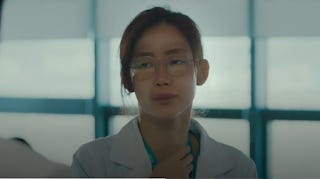
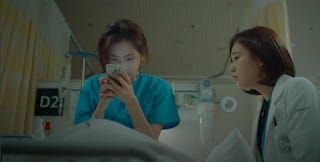
The moral of the lesson here in this parallel is that when a man is in love with a woman, he goes beyond the usual boundaries of friendship and/or collegiality. He preferences her in a way that he doesn't with others. Her welfare becomes so paramount that it consumes his emotions. He can't rest until he is sure that she is out of harm's way. Love can be a beautiful thing in that regard. Even though it brings Jeong-won turmoil in the interim it brings out the better part of him.
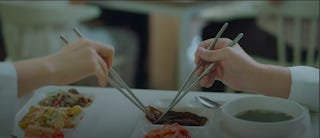
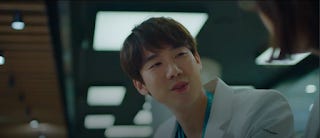
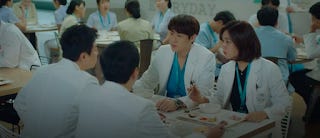
The cafeteria scene featuring Jeong-won, Seok-hyeong, Ik-jun and Min-ha is one of those moments that contain so much more meaning than first meets the eye. It is the point where all the large threads of the season coalesce in a one place. The table is first occupied by Min-ha and Seok-hyeong with two unknown staff members. She shows her romantic intent first by asking him about the woman in the blue lace dress that he was speaking to earlier. He is a picky eater and she helps him with his meal by tapping on one of his side dishes. That apparently signals her interest in him. He looks up surprised but not repulsed. Later Jeong-won and Ik-jun arrive and occupy the two seats recently vacated. After some chiding by Ik-jun about his loner habits, Seok-hyeong tells Ik-jun that he is having lunch with his resident who's in front of him possibly to counter that charge. Jeong-won in friendly fashion turns to Min-ha and mentions that he knows that she is best friends with Jang Gyeo-ul because he has seen them around together. (This shows of course that Jeong-won is far more mindful and observant of Gyeo-ul than he probably lets on) As soon as she's mentioned Ik-jun then says that Gyeo-ul had an anaphylactic attack and everyone expresses their concern.
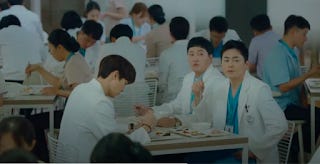
In this shot, we see Jeong-won looking down at his tray, in a very sharp change of mood and playing with his food paralleling what Seok-hyeong did earlier. Seok-hyeong's attention is still focused on Min-ha who has left the table rather hurriedly. So what we have here are two men, best friends showing uncharacteristic interest in two women who are also best friends. Ik-jun, the observer, is the figure of neutrality here and what's fascinating is that he later becomes the person who helps his two male friends mediate their feelings for the two women in question.What's also significant is that both Jeong-won and Seok-hyeong are holding back their feelings for the two women because of whatever baggage it is that they're carrying around. They are reluctant and slow to act on their feelings. The Sloth, as is befitting his name, is a far more reluctant lover than even the Virgin.
Meanwhile Jun-wan is on tenterhooks waiting for Ik-sun's response to his confession. He maybe deluded in thinking he is doing a good job hiding his anxiety but his office mate and his chief resident are on to him in no time. This situation exemplifies an ongoing theme of the show: You can't hide things from your nearest and dearest. It is helpful too that Jeong-won says this of Song-hwa in prophetic fashion: "She acts as if everything is fine, but something is up." This is richly ironic especially coming from him because he is someone else who thinks he can hide his feelings from the people around him but as subsequent episodes show, he in fact, an entirely open book to them to those who know him best. They know when he's depressed. They know when a patient does well or doesn't. They know when he's worried. Even when he remains tight-lipped, they certainly know when he's fallen in love... who he's fallen for and even what he's decided to do at the end.
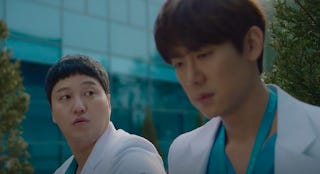
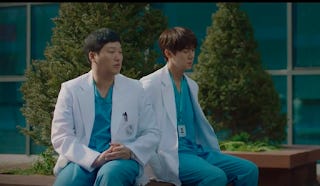
My other favourite part of the episode is the moment where Song-hwa reveals that she's done a biopsy to the men at the Chinese restaurant. It's a bleakly humorous sequence that's cleverly shot as the Lazy Susan is spun around from person to person. JKH doing his schtick as Jun-wan is my absolute favourite reaction to the news. His naggy, grumpy retorts are just the best. It's a perfect reflection of who he is hiding his concern behind the cranky exterior. All their reactions are right on the money but his is the funniest because when he bites, she bites back too. Personally I get the most amusement from his relationship with Song-hwa out of all the men. He brings out another side to her that I don't see anyone else doing. Their ongoing gluttonous companionship is always a hoot, giving off a really strong family/sibling vibe in their interactions.
What I'm also struck by his how quiet Ik-jun is about this revelation. Aside from non-sequiturs doesn't say much and he keeps his feelings under wraps until he shows up at the other hospital the next day.
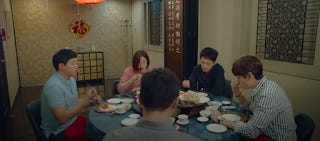
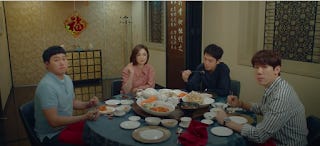
Here I'm led to think more about Song-hwa, who is an archetype and it's become evident to me that her role in the first season is largely that of a Sage. A Wise Teacher. In all her activities, she listens, guides as well as corrects. (A veritable Obi-wan Kenobi) Even when others (Chi-hong and Ik-jun) have other sorts of feelings for her, she maintains a high level of neutrality and objectivity. She appears to be uncomfortable being perceived as anything more than a confidante and a teacher. Clearly she's no longer that girl who had a crush on Ik-jun all those years ago. Her scene with Ik-jun outside the waiting room is very helpful in that regard.
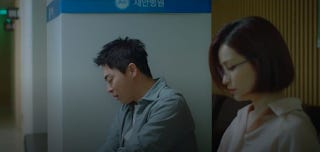
Here she toys with the possibility that she might have cancer. He immediately says, "I'll fix you." Her answer is very instructive and fits in with my thesis that she is the Sage. She doesn't acknowledge the romantic undertones of what he says but goes straight to the practical implications. It's a dangerous thing for a doctor to say, she observes dispassionately. It's an answer no doctor should ever give to a patient. Now that she's on the other side of a prognosis, she understands the implications of giving patients false hope even with the best of intentions.
It harkens back to our first encounter between Jeong-won and Gyeo-ul where he tells her that there are many reasons why doctors can't give firm, absolute answers and shouldn't. We have also referred to a similar incident that occurred between Jun-wan and Jae-hak. Medicine is riddled with uncertainties because the way individuals react to treatments varies physiological and psychologically. Human beings are not machines but emotional creatures. Emotions also play a role in the recovery process. In that sense medicine is as much an art as it is a science because doctors are always on that tightrope to find that delicate balance of being truthful and not wanting to take hope way from patients and caregivers.


